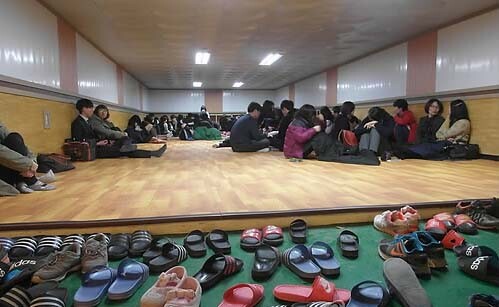hankyoreh
Links to other country sites 다른 나라 사이트 링크
Seoul plans follow-up measures to Dresden speech on unification

By Seok Jin-hwan, Blue House correspondent and Yi Yong-in, staff reporter
In connection with South Korean President Park Geun-hye‘s Dresden speech, which represented a grand overture to North Korea, the South Korean government has begun reviewing follow-up measures, with meetings scheduled at all related ministries during the week.
But with Park still reluctant to take active measures such as moving first to propose dialogue with North Korea, it seems premature to expect the three proposals she made during the address to lead to a breakthrough in inter-Korean relations.
On Mar. 30, a government official announced plans for related ministries to discuss follow-up measures before the end of the week. When asked about what these discussions would entail, the official suggested that the agencies would work on determining the priority of Park’s proposals to the North, decide which to pursue first, and develop a roadmap for action.
“The government will make an additional announcement later after the various departments in charge of the areas connected with Park’s proposals work out the details and iron out the kinks in the follow-up measures for these proposals,” said a source at the Blue House on condition of anonymity.
But even though deliberations and negotiations with North Korea are the first step toward bringing about the three proposals for the North that Park made during her address, the government remains passive about making first contact with Pyongyang.
A press release issued by the Blue House immediately after Park’s address in Dresden stated that the government still means to work on resolving issues through dialogue with the caveat that issues such as whether to take the initiative in proposing talks would be decided according to a variety of circumstances including the conditions for dialogue.
“Since we have made our proposal, it is only natural for us to wait for a while and gauge the other side’s [North Korea’s] reaction,” said the Blue House official. Rather than making a serious effort to draw in North Korea, the government seems content with leaving the decision to Pyongyang.
It also seems unlikely that North Korea will respond before the middle of April. “The North has its own political schedule to follow. Pyongyang will also fine-tune its response according to the action South Korea takes after the end of the Foal Eagle joint military exercises with the US,” said a government official on Mar. 30.
On Apr. 7, the North Korean Supreme People’s Assembly will convene, while Apr. 15 is the Day of the Sun, a holiday held on the birthday of North Korean founding leader Kim Il-sung. In the past, North Korea has often delayed announcing decisions about its foreign policies until after important political events have wrapped up.
In addition, the US-Korea joint military exercises - to which North Korea strongly objects - will continue until Apr. 18. “It would be difficult for North Korea to respond in the current situation,” said Kim Chang-soo, director of research at the Korea National Strategy Institute. “North Korea will react after the joint military exercises are over.”
It is too early to say whether North Korea will accept or reject the proposals outlined in Park’s address in Dresden. In a statement in the name of the spokesperson of the North Korean delegation to the high-level talks with South Korea that appeared in the Mar. 29 issue of the Rodong Sinmun, North Korea claimed that the South Korean military had distributed propaganda leaflets about North Korea around the five islands in the West (Yellow) Sea. The North also criticized President Park Geun-hye by name.
But the statement also indicated that North Korea still wants to improve relations with the South, stating, “improving inter-Korean relations through democratic reconciliation and solidarity is a great river whose course cannot be reversed.”
Please direct questions or comments to [english@hani.co.kr]

Editorial・opinion
![[Column] Season 2 of special prosecutor probe may be coming to Korea soon [Column] Season 2 of special prosecutor probe may be coming to Korea soon](https://flexible.img.hani.co.kr/flexible/normal/500/300/imgdb/original/2024/0426/3317141030699447.jpg) [Column] Season 2 of special prosecutor probe may be coming to Korea soon
[Column] Season 2 of special prosecutor probe may be coming to Korea soon![[Column] Park Geun-hye déjà vu in Yoon Suk-yeol [Column] Park Geun-hye déjà vu in Yoon Suk-yeol](https://flexible.img.hani.co.kr/flexible/normal/500/300/imgdb/original/2024/0424/651713945113788.jpg) [Column] Park Geun-hye déjà vu in Yoon Suk-yeol
[Column] Park Geun-hye déjà vu in Yoon Suk-yeol- [Editorial] New weight of N. Korea’s nuclear threats makes dialogue all the more urgent
- [Guest essay] The real reason Korea’s new right wants to dub Rhee a founding father
- [Column] ‘Choson’: Is it time we start referring to N. Korea in its own terms?
- [Editorial] Japan’s rewriting of history with Korea has gone too far
- [Column] The president’s questionable capacity for dialogue
- [Column] Are chaebol firms just pizza pies for families to divvy up as they please?
- [Column] Has Korea, too, crossed the Rubicon on China?
- [Correspondent’s column] In Japan’s alliance with US, echoes of its past alliances with UK
Most viewed articles
- 1[Column] Season 2 of special prosecutor probe may be coming to Korea soon
- 2‘We must say no’: Seoul defense chief on Korean, USFK involvement in hypothetical Taiwan crisis
- 3Is N. Korea threatening to test nukes in response to possible new US-led sanctions body?
- 4Division commander ordered troops to enter raging flood waters before Marine died, survivor says
- 5Amnesty notes ‘erosion’ of freedom of expression in Korea in annual human rights report
- 6Is Japan about to snatch control of Line messenger from Korea’s Naver?
- 7No good, very bad game for Korea puts it out of Olympics for first time since 1988
- 8[Editorial] Korea’s surprise Q1 growth requires objective assessment, not blind fanfare
- 9N. Korean delegation’s trip to Iran shows how Pyongyang is leveraging ties with Moscow
- 10Korea’s 1.3% growth in Q1 signals ‘textbook’ return to growth, says government